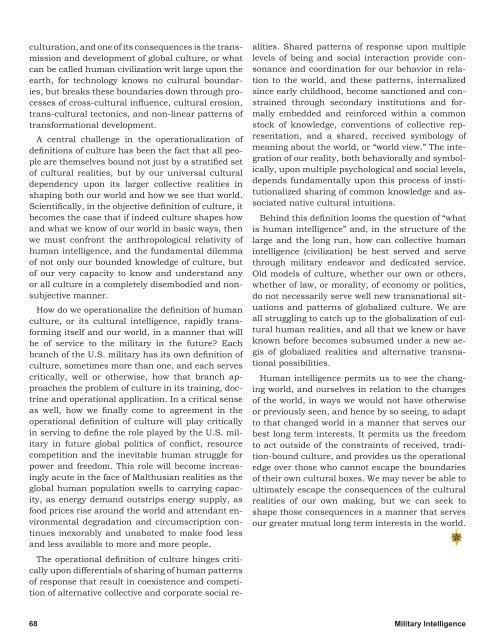George w. casey jr. - Federation of American Scientists
George w. casey jr. - Federation of American Scientists
George w. casey jr. - Federation of American Scientists
You also want an ePaper? Increase the reach of your titles
YUMPU automatically turns print PDFs into web optimized ePapers that Google loves.
culturation, and one <strong>of</strong> its consequences is the transmission<br />
and development <strong>of</strong> global culture, or what<br />
can be called human civilization writ large upon the<br />
earth, for technology knows no cultural boundaries,<br />
but breaks these boundaries down through processes<br />
<strong>of</strong> cross-cultural influence, cultural erosion,<br />
trans-cultural tectonics, and non-linear patterns <strong>of</strong><br />
transformational development.<br />
A central challenge in the operationalization <strong>of</strong><br />
definitions <strong>of</strong> culture has been the fact that all people<br />
are themselves bound not just by a stratified set<br />
<strong>of</strong> cultural realities, but by our universal cultural<br />
dependency upon its larger collective realities in<br />
shaping both our world and how we see that world.<br />
Scientifically, in the objective definition <strong>of</strong> culture, it<br />
becomes the case that if indeed culture shapes how<br />
and what we know <strong>of</strong> our world in basic ways, then<br />
we must confront the anthropological relativity <strong>of</strong><br />
human intelligence, and the fundamental dilemma<br />
<strong>of</strong> not only our bounded knowledge <strong>of</strong> culture, but<br />
<strong>of</strong> our very capacity to know and understand any<br />
or all culture in a completely disembodied and nonsubjective<br />
manner.<br />
How do we operationalize the definition <strong>of</strong> human<br />
culture, or its cultural intelligence, rapidly transforming<br />
itself and our world, in a manner that will<br />
be <strong>of</strong> service to the military in the future? Each<br />
branch <strong>of</strong> the U.S. military has its own definition <strong>of</strong><br />
culture, sometimes more than one, and each serves<br />
critically, well or otherwise, how that branch approaches<br />
the problem <strong>of</strong> culture in its training, doctrine<br />
and operational application. In a critical sense<br />
as well, how we finally come to agreement in the<br />
operational definition <strong>of</strong> culture will play critically<br />
in serving to define the role played by the U.S. military<br />
in future global politics <strong>of</strong> conflict, resource<br />
competition and the inevitable human struggle for<br />
power and freedom. This role will become increasingly<br />
acute in the face <strong>of</strong> Malthusian realities as the<br />
global human population swells to carrying capacity,<br />
as energy demand outstrips energy supply, as<br />
food prices rise around the world and attendant environmental<br />
degradation and circumscription continues<br />
inexorably and unabated to make food less<br />
and less available to more and more people.<br />
The operational definition <strong>of</strong> culture hinges critically<br />
upon differentials <strong>of</strong> sharing <strong>of</strong> human patterns<br />
<strong>of</strong> response that result in coexistence and competition<br />
<strong>of</strong> alternative collective and corporate social realities.<br />
Shared patterns <strong>of</strong> response upon multiple<br />
levels <strong>of</strong> being and social interaction provide consonance<br />
and coordination for our behavior in relation<br />
to the world, and these patterns, internalized<br />
since early childhood, become sanctioned and constrained<br />
through secondary institutions and formally<br />
embedded and reinforced within a common<br />
stock <strong>of</strong> knowledge, conventions <strong>of</strong> collective representation,<br />
and a shared, received symbology <strong>of</strong><br />
meaning about the world, or “world view.” The integration<br />
<strong>of</strong> our reality, both behaviorally and symbolically,<br />
upon multiple psychological and social levels,<br />
depends fundamentally upon this process <strong>of</strong> institutionalized<br />
sharing <strong>of</strong> common knowledge and associated<br />
native cultural intuitions.<br />
Behind this definition looms the question <strong>of</strong> “what<br />
is human intelligence” and, in the structure <strong>of</strong> the<br />
large and the long run, how can collective human<br />
intelligence (civilization) be best served and serve<br />
through military endeavor and dedicated service.<br />
Old models <strong>of</strong> culture, whether our own or others,<br />
whether <strong>of</strong> law, or morality, <strong>of</strong> economy or politics,<br />
do not necessarily serve well new transnational situations<br />
and patterns <strong>of</strong> globalized culture. We are<br />
all struggling to catch up to the globalization <strong>of</strong> cultural<br />
human realities, and all that we knew or have<br />
known before becomes subsumed under a new aegis<br />
<strong>of</strong> globalized realities and alternative transnational<br />
possibilities.<br />
Human intelligence permits us to see the changing<br />
world, and ourselves in relation to the changes<br />
<strong>of</strong> the world, in ways we would not have otherwise<br />
or previously seen, and hence by so seeing, to adapt<br />
to that changed world in a manner that serves our<br />
best long term interests. It permits us the freedom<br />
to act outside <strong>of</strong> the constraints <strong>of</strong> received, tradition-bound<br />
culture, and provides us the operational<br />
edge over those who cannot escape the boundaries<br />
<strong>of</strong> their own cultural boxes. We may never be able to<br />
ultimately escape the consequences <strong>of</strong> the cultural<br />
realities <strong>of</strong> our own making, but we can seek to<br />
shape those consequences in a manner that serves<br />
our greater mutual long term interests in the world.<br />
68 Military Intelligence















